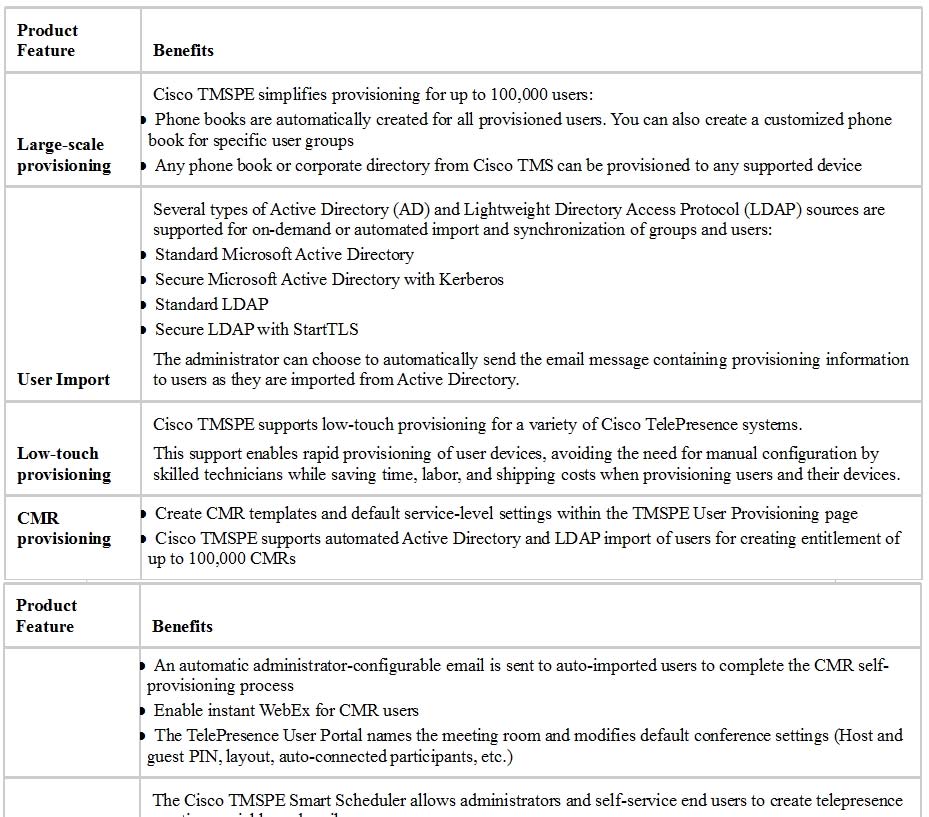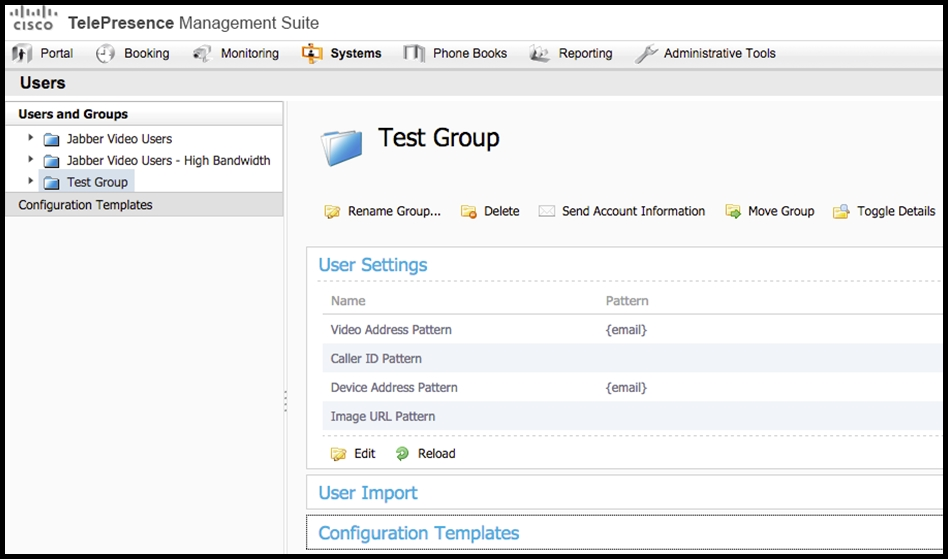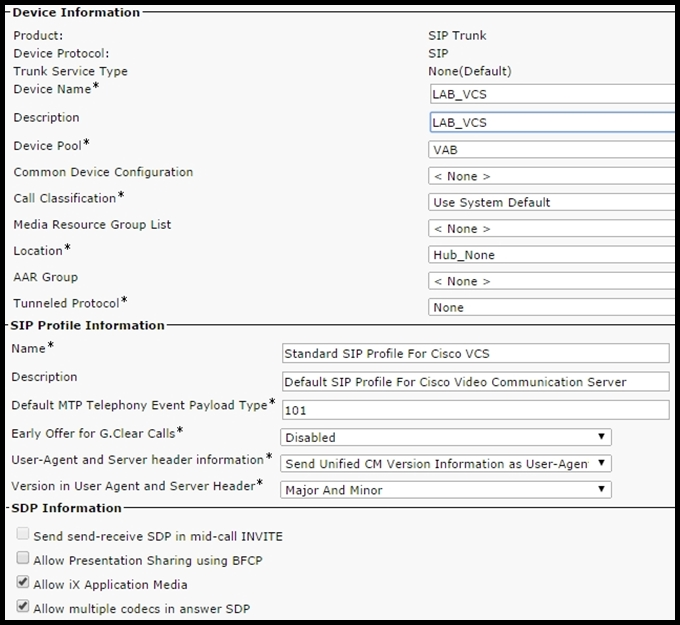

Which four features are provided by Cisco TelePresence Management Suite? (Choose four.)
Correct Answer:
ADEF
🗳️
Reference: http://www.cisco.com/c/en/us/products/collateral/conferencing/telepresence-management-suite-tms/data_sheet_c78-707529.html
Features of Cisco TMS include:
✑ Centralized management of all conferences, impromptu and scheduled, in real time
✑ Flexible scheduling tools designed to meet the needs of basic users for quick conference creation, including integration with Microsoft Exchange for scheduling through Outlook clients, and to provide advanced conference booking options for sophisticated users
✑ Robust and flexible phone book management that supports synchronization with a wide range of directories, including external sources for easy contact management
✑ A selection of ready-to-use reports and support for the creation of fully customizable reports to answer specific business questions
Which three features are supported by Cisco TMSPE? (Choose three.)
Correct Answer:
ABD
🗳️
Reference: http://www.cisco.com/c/en/us/products/collateral/conferencing/telepresence-management-suite-tms/data_sheet_c78-707901.html
Table 1. Features and Benefits of Cisco TMSPE
Management wants to modify Cisco TMS to allow users to configure the call behavior with their associated devices and dial from a single ID. Which feature needs to be enabled and configured?
Correct Answer:
C
🗳️
Reference: http://www.cisco.com/c/en/us/products/collateral/conferencing/telepresence-management-suite-tms/data_sheet_c78-707901.html
With FindMe, you can be reached on any device using a single ID
You can define your locations and specify which endpoints are available to you in those locations
You can also specify which endpoints (video and audio only) should ring when someone calls your FindMe ID
FindMe also allows you to specify additional devices to be called if the default devices are busy or not answered
Administrators can configure account IDs for each user, set up location and device templates, and choose whether to add new devices to FindMe automatically on provisioning
You can create FindMe accounts to define forwarding rules for groups such as support desks
The FindMe portal is located on the Cisco TMS Server, where you can log on with your Active Directory credentials
You can access your Cisco TMSPE account settings, see your username and video address (Session Initiation Protocol Uniform Resource Locator [SIP URI]), and change your provisioning password.
Refer to the exhibit.
Which configuration item shown in the exhibit should be used to assign the internal and external video communication server address for this group of users?
Correct Answer:
C
🗳️
http://www.cisco.com/c/dam/en/us/td/docs/telepresence/infrastructure/tms/admin_guide/Cisco-TMS-Admin-Guide-14-6.pdf
A network engineer wants to automate the monitoring of Cisco TelePresence TX systems. Which step should the engineer take first?
Correct Answer:
E
🗳️
http://www.cisco.com/c/en/us/td/docs/telepresence/tx_sw/6_0/admin/guide/tx_6_0_admin_guide/tx_sw_mntr.html#21386
Using SNMP Traps to Monitor the Cisco TelePresence System
Cisco provides you with management information bases (MIB) files that are designed to monitor your system using the Simple Network Management Protocol
(SNMP). For more information, refer to the "MIBs, RFCs, and SNMP Trap Messages for the Cisco TelePresence System"chapter of the Cisco TelePresence
System Message Guide .
A technician is tasked with performing a room readiness assessment in preparation for an immersive video endpoint. What are three Cisco best practices regarding lighting recommendations for the room? (Choose three.)
Correct Answer:
ACE
🗳️
Reference: http://www.cisco.com/en/US/solutions/collateral/ns669/c07-643449-00_tp_dg.pdf
In summary, Immersive Cisco TelePresence rooms should be designed with lighting that is:
Kelvin color temperature of 4000 or 4100K to match the built-in Cisco TelePresence endpoint lighting, and to reproduce colors accurately on screen.
CRI of 82 to 100.
Facial lighting from 200 to 400 lux, with these values measured with the Cisco TelePresence endpoint off.
Shoulder lighting not to exceed twice the values of the facial lighting, and also measured with the Cisco TelePresence endpoint off.
Light in all areas of the room within the camera field of view should not fluctuate more than 100 lux within the room. In other words, lighting is evenly dispersed throughout the room. This includes lighting at the room walls, which should be equal to or less than the facial lighting and should differ no more than 100 from rest of the room.
Implementation of a dimming lighting control system is highly recommended to adjust the intensity of light in the room without needing to precisely calculate the overall lighting levels in advance, and to ensure reproducible results with preset lighting scenes.
Regardless of fixture choices, indirect fluorescent lighting fixtures provide the best results for ambience and amount of dispersed lighting, and asymmetric fixtures provide the most efficient and predictable option within the range of indirect fixtures available
Refer to the exhibit.
A network engineer configures a Cisco Unified Communications Manager and VCS integration via a SIP trunk. Endpoint A is able to conduct video calls to
Endpoint B. When Endpoint A attempts to share presentation content with Endpoint B, Endpoint B sees the presentation video on the main screen rather than on the presentation display. What is the cause?
Correct Answer:
D
🗳️
Reference: http://www.cisco.com/c/dam/en/us/td/docs/telepresence/infrastructure/vcs/config_guide/
Cisco_VCS_Cisco_Unified_Communications_Manager_Deployment_Guide_CUCM_8_9_and_X7-2.pdf
Configuring the SIP Profile for phone devices This creates the SIP Profile that is to be applied to all phone devices.
1. On Unified CM, go to Device> Device Settings> SIP Profile.
2. Click Copy against the Standard SIP Profile.
3. Configure the following fields, leaving everything else a sits default value:
4. Click Save
Which three features does Cisco VCS provide? (Choose three.)
Correct Answer:
BDE
🗳️
Reference: http://www.cisco.com/c/en/us/products/collateral/unified-communications/telepresence-video-communication-server-vcs/data_sheet_c78-626491.html
Cisco VCS features:-
✑ SIP registrar and SIP proxy server
✑ H.323 gatekeeper interoperability and interworking between SIP and H.323 standards-compliant endpoints and support for communication with IBM Lotus
Same time and Microsoft Lync environments, including Microsoft Lync 2013 (H.264 SVC) clients
A Unified Communications engineer wants to configure a Cisco TelePresence SX endpoint using static IP addressing to use a different TFTP server. Which path will allow the engineer to complete this configuration?
Correct Answer:
D
🗳️
Reference: http://www.cisco.com/c/en/us/support/docs/conferencing/telepresence-management-suite-tms/200263-Configure-TMS-to-change-Provisioning-of.html
Using Web interface
1. Navigate to Configuration > System Configuration > Provisioning on the endpoint.
2. Navigate to ExternalManager section and enter the Address, which can be an IP address, DNS name or the path of the External Manager which is the CUCM cluster TFTP server address . Click Save.
3. Navigate to Mode and set the provisioning mode to CUCM. Click Save.
Which two protocols can be used with the Cisco TelePresence Content Server to allow users to share content from their laptops? (Choose two.)
Correct Answer:
AB
🗳️
Reference: http://www.cisco.com/c/en/us/about/press/internet-protocol-journal/back-issues/table-contents-57/153-binary.html http://www.cisco.com/c/en/us/td/docs/telepresence/infrastructure/articles/cisco_telepresence_enable_dual_video_duo_people_content_h239_codian_kb_69.html
Protocol Details -
The basic concept of floor control is analogous to managing a live in-person presentation, where you want to control who is presenting, manage and transition your presenters, and maintain a feedback loop. Also important is the ability to allow a presenter to show slides and share with your audience a white board or transparency projector.
Dual video, Duo Video, People + Content and H.239 are all terms that describe support for a second live video channel in an H.323 call. Such a channel is most often used for the transmission of content, like the screen of a presenter's PC (so the term 'content channel' is also used). The terms all have slightly different meanings. Dual video is a generic term describing this capability. Duo Video and People + Content are proprietary implementations from Cisco TelePresence and
Polycom respectively.H.239 is the ITU standard for a second video channel; this is supported by all the major vendors, and is the only content channel standard supported by Cisco acquired Codian products or Cisco TelePresence Serial Gateway Series products on H.323 video calls.